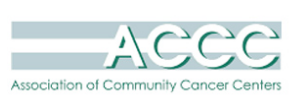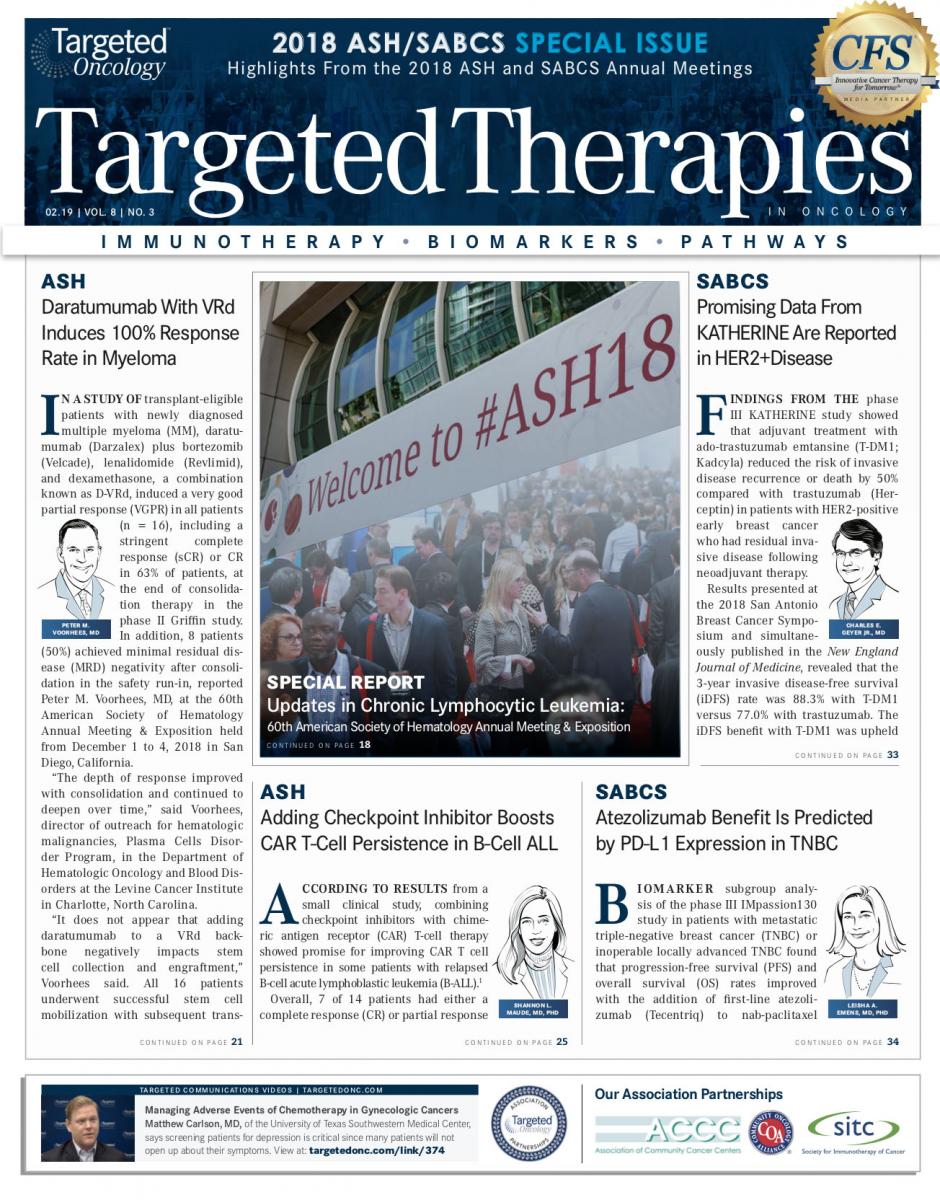Technology Continues to Grow Despite Payment Hurdles, According to ACCC Survey
Hurdles imposed by payers and high drug costs present increasing barriers to technological and precision medicine advancements in cancer programs, according to a recent survey by the Association of Community Cancer Centers.

Hurdles imposed by payers and high drug costs present increasing barriers to technological and precision medicine advancements in cancer programs, according to a recent survey by the Association of Community Cancer Centers (ACCC). Still, telehealth and other new treatment modalities continue to play an increasingly larger role in cancer care in easing administrative burden and broadening access to patient care.
The ACCC’s 2018 Trending Now in Cancer Care annual survey included responses from 205 cancer institutions, with hospitals and medical centers collectively representing the majority (89%) of those surveyed. Independent and freestanding cancer centers made up 11% of the total.
“The [survey] provides much-needed perspective on strengths and challenges experienced by cancer programs across the country,” Thomas A. Gallo, MS, MDA, president of the ACCC, said in a statement. This year marks the release of the ninth annual ACCC survey designed to identify current and emerging trends across cancer programs nationwide.
Telehealth is a widely acknowledged term for the use of digital information and communication technologies intended for remote access to healthcare services. These are thought to save money associated with cancer care while enabling oncologic services to be delivered in communities that lack specialized care. According to the report, telehealth is establishing a strong foothold in oncology care.
“Telehealth has tremendous potential for our cancer programs,” Mark S. Soberman, MD, MBA, FACS, immediate past president of ACCC, said in an interview withTargeted Therapies in Oncology. “It is a way to provide services at a lower cost with less resources...and I do not think there is any disagreement that it is worth pursuing and can create value.”
Currently, the most popular services under telehealth include genetic counseling (35%), oral chemotherapy adherence education and support (20%), and symptom management consults (19%). Survey respondents said they plan to provide further services within the next 2 years, primarily in survivorship visits (33%), genetic counseling (29%), oral chemotherapy adherence education and support (48%), and symptom management consults (28%).
Many cancer programs, however, reported challenges in fully implementing telehealth. The majority (70%) of respondents said they struggled with reimbursement issues as well as staff shortages, inadequate technology, and other operational challenges (64%). Less than half (41%) of the cancer programs said they did not have sufficient capital to invest in telehealth technology.
According to Soberman, payers have been slow to align reimbursement policies with the clinical needs of telehealth. “It is great that we can provide care in a lower-cost setting without compromising the quality of care, but if we are penalized in terms of reimbursement, it can create problems for sustainability,” he said.
Electronic health records (EHRs)designed to broaden access to patient care information—are another innovative treatment modality that the majority (69%) of cancer centers said “significantly improved” or “somewhat improved” their care coordination.
Limitations persist with EHRs, however, and hoped-for efficiency remains unrealized. Nearly 70% of the survey respondents agreed that EHRs have lengthened the workdays of physicians and staff members. This has either “significantly worsened” or “somewhat worsened” the well- being of providers, according to 59% of the cancer programs who responded to the survey.
Nearly all respondents (97%) reported interoperability challenges with EHRs, including the limited ability to transmit patient care infor- mation to other systems. Additionally, a lower percentage (41%) of survey respondents said that EHRs have a negative impact on providerpatient interactions during appointments, and a quarter (26%) said that EHRs negatively affect physician and staff retention.
“Many of the enterprise EHRs that are used by health systems are not oncology specific or do not have an efficient oncology module,” added Soberman. “Order entry and clinical data are important in oncology, and they may not be captured by current EHRs.” He said the software vendors could be to blame for many of the hurdles of EHRs listed by the cancer programs because they have not fully understood how physicians interact with their products.
Among difficulties cited in growing practices, prior-authorization hurdles established by payers were cited by 48% of the respondents. The cost of drugs and new treatment modalities was also noted as a top inhibitor by 48% of the participants, followed closely by uncertainties in drug pricing reform policies (40%), workforce planning (36%), and marketplace competition (36%).
Barriers to payment and the cost of drugs have hindered nearly three-fourths (72%) of cancer practices from offering immunotherapy treat- ments to their patients, according to the survey. Sixty-three percent of the cancer programs said that payer prior-authorization requirements, including the Center for Medicare & Medicaid Services’ (CMS) 14-day rule, were one of the largest barriers to biomarker testing for patients. Under the CMS rule, cancer programs cannot bill Medicare for specific molecular testing ordered less than 14 days after a patient who receives outpatient care is discharged from their practice.
“While precision medicine is the future of cancer treatment and offers the promise of improved patient outcomes, cancer care providers face numerous challenges delivering this type of care to their patients,” the report said. Other barriers to molecular testing included in the survey were concerns about payment (68%) and insufficient protocols for collecting adequate tissue samples (37%).
Seventy-nine percent of cancer programs reported they were either somewhat or very concerned that patients with cancer would refuse treatment because of financial worries. According to the report, almost half (49%) of the survey respondents cited an instance of a patient with cancer who had refused treatment within the previous 12 months.
Another major barrier to precision medicine addressed in the survey was the initiation of clinical trials. The cancer programs reported that among patient-driven challenges, lack of patient understanding of the clinical trial process (66%), lack of patient awareness of clini- cal trial options (56%), and patient concerns about historical stigma related to clinical trials (37%) were 3 major inhibitors.
Practice challenges cited included program infrastructure needs (58%), such as access to technology to identify patients eligible for treatment and tracking outcomes; staff resources and training (55%); and physician engagement and awareness (46%).
Concerns about workflow inefficiencies (75%), heavy workload (67%), and lack of worklife balance (46%) ranked highest among the cancer practice respondents and were the same concerns expressed by their staff members. Also, 38% of those polled said staff turnover was a problem at their cancer program.
Almost half (45%) of the respondents reported turnover of advanced practitioners within the previous 12 months. Advanced practitioners were defined mainly as nurse practitioners (87%), followed by physician assistants (42%) and clinical nurse specialists (15%).
Cancer programs reported that most nurses left for personal reasons (56%); however, additional reasons included compensation (34%), inflexible scheduling (20%), and nurse-to-patient ratios (17%). A high percentage of practices said their daily nurse-to-patient ratio was 1:6 or 1:4 (18% for both), 1:3 (12%), and 1:5 (10%). Eleven percent of the respondents were unsure of the ratio.
According to Soberman, work burden could be alleviated with multidisciplinary teams in cancer practices. “We need to organize care in a way that limits the burden on our providers. With multidisciplinary teams, providers can do the things they do best and have others team members do what they do best,” he said, adding that EHRs and better ways of documenting care could also minimize activities not related to caregiving.
Advanced practitioners were reported as being heavily engaged in the symptom management of patients (95%) and follow-up patient visits in the outpatient clinic (88%). Additionally, nurse navigators (16%) ranked as the most popular supportive care staff among the cancer programs.
According to the survey, however, most supportive care services are not reimbursed by payers but are instead paid for out of the organiza- tion’s operating budget, followed by funds raised by the organizations in the form of grants, corporate gifts, and individual donors.
Symptom management (36%), care coordination (45%), and an increase in the number of subspecialists (44%) were the top 3 invest- ments likely to yield a return. Many cancer program participants (38%) have already put these initiatives into motion in the form of an urgent symptom management clinic, which some said will be added to their practice within the following 2 years.
Reference:
Association of Community Cancer Centers 2018 survey finds multiple barriers to cancer program growth [news release]. Rockville, MD: Association of Community Cancer Centers; January 17, 2019. prnewswire. com/news-releases/association-of-community-cancer-centers-2018-survey-finds-multiple-barri- ers-to-cancer-program-growth-300780021.html?tc=eml_cleartime. Accessed January 18, 2019.
Survivorship Care Promotes Evidence-Based Approaches for Quality of Life and Beyond
March 21st 2025Frank J. Penedo, PhD, explains the challenges of survivorship care for patients with cancer and how he implements programs to support patients’ emotional, physical, and practical needs.
Read More
